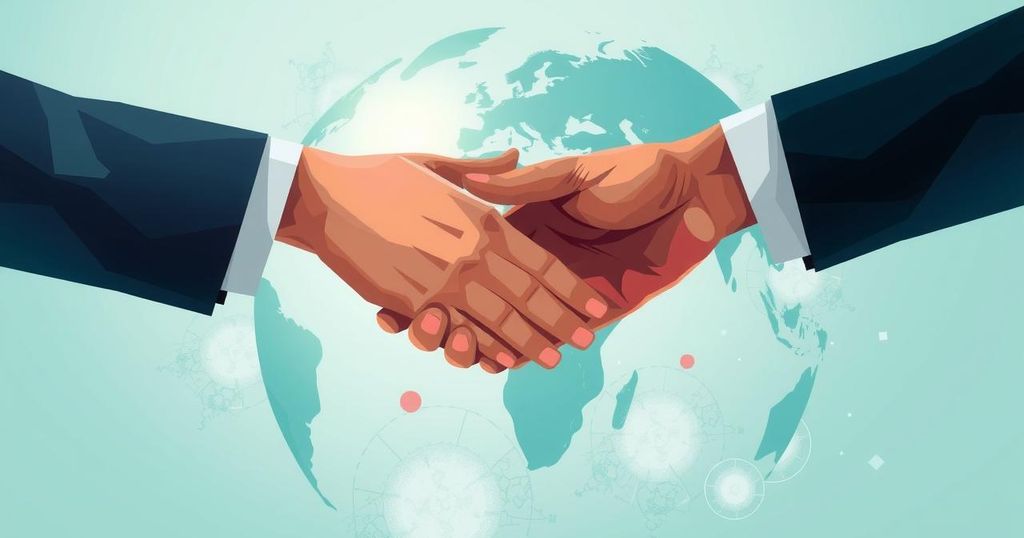High-Stakes Diplomacy: Ramaphosa Meets Trump Amid Growing Tensions
President Cyril Ramaphosa of South Africa is set to meet U.S. President Trump, amidst rising tensions regarding U.S. aid cuts and claims of “white genocide” affecting Afrikaners in South Africa. The meeting represents the first visit of an African leader to the Trump White House since early 2025 and is pivotal for future U.S.-South Africa relations, especially in light of approaching global summits and ongoing trade disputes.
In a notable diplomatic meeting this week, South African President Cyril Ramaphosa is set to engage with U.S. President Trump at the White House. The agenda includes discussions on various bilateral, regional, and global matters, but this interaction comes amid rising tensions stemming from recent U.S. aid cuts and misunderstandings about South Africa’s land reform policies. The meeting also marks the first visit of an African leader to the White House under Trump’s government since he assumed office in January 2025.
The geopolitical tensions have noticeably intensified since Trump’s return to the presidency in 2025. He notably amplified misleading claims regarding a so-called “white genocide” in South Africa, allegedly affecting Afrikaner farmers. Trump’s comments insinuated that these farmers are victims of persecution, which South African officials have consistently dismissed as unfounded. Both Trump and his advisor, Elon Musk, have recently drawn scrutiny for promoting narratives that imply racial persecution, leading to confusion and anger back home.
In a somewhat controversial development, the U.S. government recently extended asylum to over 40 South Africans who claimed to be living in constant fear of violence. However, Deputy Secretary of State Christopher Landau noted their situation as one of living under a “shadow of violence and terror.” Despite these claims, the South African government refuted such allegations, saying there is no evidence of ongoing persecution, asserting that their country’s safety is secure.
Amid these tensions, Musk’s chatbot Grok has become a focal point of contention. Users pointed out its promotion of the “white genocide” theory, often linking it to unrelated topics, raising questions about the AI’s potential political bias. Award-winning journalist Qaanitah Hunter expressed concern regarding Grok’s malfunctioning, while media personality Redi Tlhabi emphasized ongoing disinformation campaigns against South Africa.
Economic impacts from Trump’s administrative moves are also looming large. In February, his executive order cut off substantial aid to South Africa, positioning the government as a body enacting unfair property confiscation policies. The cuts threaten vital programs addressing HIV/AIDS issues that heavily rely on American funding. South Africa holds the world’s largest population living with HIV, and this funding interruption is quite serious—not only for healthcare but also for broader societal stability.
On the trade front, tensions are palpable as the U.S. slapped hefty tariffs on South African exports, including a striking 55% tariff on vehicles. Ramaphosa criticized these penalties as harmful to fair trade, calling for cooperation and shared prosperity. Additionally, with the upcoming review of the African Growth and Opportunity Act (AGOA) status, uncertainty looms over future trade relations between the two nations.
Looking ahead, the Ramaphosa-Trump meeting is expected to significantly shape the U.S. approach to the G20 Summit in Johannesburg. South Africa aims to assert its leadership role amongst developing nations, but the dynamics are precarious. Notably, prominent figures in the Trump administration, such as Secretary of State Marco Rubio, have hinted at a possible boycott of the Summit, which would demonstrate a significant diplomatic shift and could elevate China’s role on the world stage.
Compounding these issues are South Africa’s stances on global matters like its legal case against Israel and support for Ukraine, adding layers of complexity to U.S.-South Africa relations. The South African government feels assured by the invitation extended to Ramaphosa from Trump, suggesting a potential for engaging dialogue, but the contentions surrounding land reform, trade, and international alliances signal a challenging road ahead for both leaders.
In summary, the meeting between President Ramaphosa and President Trump is not just about diplomatic pleasantries; it reflects deeper tensions embedded in historical narratives, economic impacts, and contrasting international priorities. The outcome of this meeting will likely play a critical role in shaping U.S.-South Africa relations as both countries approach the G20 Summit and navigate the complex terrain of trade, aid, and geopolitical alliances. The stakes are certainly high, and the world will be watching closely.
Original Source: allafrica.com




Post Comment